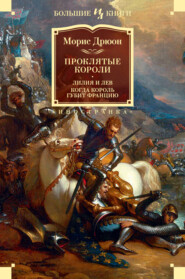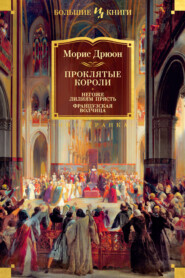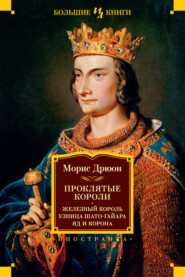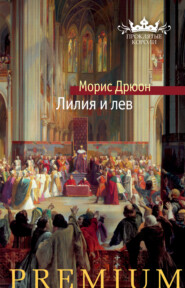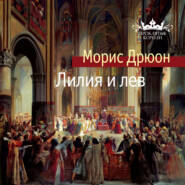По всем вопросам обращайтесь на: info@litportal.ru
(©) 2003-2025.
✖
The Iron King
Автор
Год написания книги
2019
Настройки чтения
Размер шрифта
Высота строк
Поля
Here it was that for two centuries the Templars had lived, prayed, slept, given judgment, transacted business, and decided upon their expeditions to distant lands. In this very tower the treasure of the Kingdom of France had been deposited, confided to their care and guardianship.
It was here, after the disastrous expeditions of Saint Louis, in which Palestine and Cyprus had been lost, that they had come, bringing with them in their train their esquires, their mules laden with gold, their stud of Arabian horses and their negro slaves.
Jacques de Molay saw in his mind’s eye this return of the vanquished. Even so, it had something of an epic quality.
‘We had become useless, and we did not know it,’ thought the Grand Master. ‘We were always talking of reconquest and new crusades. Perhaps we showed too much arrogance, and enjoyed too many privileges while no longer doing anything to justify them.’
From being the permanent militia of the Christian world, they had become the permanent bankers of Church and King. To have many debtors is to have many enemies.
Oh, the plot had been well conceived! The drama had begun upon the day when Philip the Fair had asked to join the Order that he might become its Grand Master. The Chapter had replied with a curt and definite refusal.
‘Was I wrong?’ Jacques de Molay asked himself for the hundredth time. ‘Was I too jealous of my authority? But no; I could not have acted otherwise; our rule is binding: no sovereign princes in our ranks.’
King Philip had never forgotten the repulse and the insult. He had begun by dissimulating, lavishing favours and kindnesses upon Jacques de Molay. Was not the Grand Master godfather to his daughter, Isabella? Was not the Grand Master the prop and stay of the kingdom?
Yet the royal treasure had been transferred from the Temple to the Louvre. At the same time a low, venomous campaign of obloquy had begun against the Templars. It was said that they speculated in corn and were responsible for famines, that they thought more of increasing their fortune than of capturing the Holy Sepulchre from the heathen. They were accused of blasphemy merely because they spoke the rough language of the camp. ‘To swear like a Templar’ became the current saying. From blasphemy to heresy was but a step. It was said that they practised unnatural vice and that their black slaves were sorcerers.
‘True it is that all our Brothers were not saints and that inaction was bad for many of them.’
Above all, it was said that during the ceremonies of initiation the neophytes were compelled to deny Christ and spit upon the Cross, that they were subjected to obscene practices.
Under the pretext of putting an end to these rumours, Philip had suggested to the Grand Master, for the sake of the honour and interest of the Order, that an inquiry should be opened.
‘And I accepted,’ thought Molay; ‘I was abominably duped and deceived.’
For, upon a certain day in October 1307 … oh, how well Molay remembered that day! ‘Upon its eve, he was still embracing me, and calling me brother, indeed giving me the place of honour at the funeral of his sister-in-law, the Countess of Valois.’
To be precise it was upon a Friday the thirteenth, an unlucky day if ever there was one, that King Philip, by means of a widespread police net, prepared long before, had arrested all the Templars of France at dawn upon a charge of heresy in the name of the Inquisition.
And Nogaret himself had come to seize Jacques de Molay and the hundred and forty knights of the Mother House.
Suddenly an order rang out. It startled the Grand Master and interrupted the flow of his thoughts, those thoughts in which he sifted yet once more the cause of the disaster. Messire Alain de Pareilles was drawing up his archers. He had put on his helmet. A soldier had his horse by the head and was holding his stirrup.
‘Let us go,’ said the Grand Master.
The prisoners were hustled towards the wagon. Molay climbed into it first. The Commander of Aquitaine, the man with the white film over his eye, who had defeated the Turks at Acre, still appeared utterly stupefied. He had to be hoisted up. The Brother Visitor was moving his lips in ceaseless, silent muttering. When Geoffroy de Charnay’s turn came to climb onto the wagon, an unseen dog began howling from somewhere in the neighbourhood of the stables, and the scar upon the Preceptor of Normandy’s forehead puckered deeply.
Drawn by four horses in tandem, the heavy wagon began to move forward.
As the huge gates opened, the crowd set up a great clamouring. Several thousand people, all the inhabitants of that district and the neighbouring ones, were crowding against the walls. The leading archers had to force a passage through the howling mob with blows of their pike-shafts.
‘Make way for the King’s men!’ cried the archers.
Erect upon his horse, his expression still impassively bored, Alain de Pareilles dominated the tumult.
But when the Templars appeared, the clamour was suddenly stilled. At the spectacle of these four emaciated old men, whom the jolting of the unsprung wheels jostled against each other, the people of Paris suffered a moment of dumb stupefaction, of spontaneous compassion.
But then cries arose of ‘Death! Death to the heretics!’ from royal agents mingling with the crowd. And then the people, always prepared to shout on the side of power and to make a noise when it costs them nothing, began to yell in concert, ‘Death to them!’
‘Thieves!’
‘Heretics!’
‘Look at them! They’re no longer so proud today, heathens that they are! Death to them!’
Insults, gibes, threats rose along the whole length of the grim procession. But the frenzy was sporadic. A whole section of the crowd remained silent, and its silence, though prudent, was none the less significant.
For things had changed in the seven years that had elapsed. The way the case had been conducted was known. People had seen Templars at the church doors showing the public the bones fallen from their feet as the result of the tortures they had suffered. It was known that in many of the towns of France the Knights had been burned by hundreds at the stake. It was known, too, that certain Ecclesiastical Commissions had refused to condemn them, and that new bishops had had to be appointed to undertake the task, and that one of them was the brother of the First Minister, Enguerrand de Marigny. It was said that Pope Clement V himself had only yielded against his will because he was in the power of the King and feared to suffer the same fate as Pope Boniface, his predecessor. And, moreover, during these seven years, corn had become no more abundant, while the price of bread had risen still further, proof that it could no longer be the fault of the Templars.
Twenty-five archers, their bows slung, their pikes upon their shoulders, marched in front of the wagon, twenty-five on each flank, and as many more brought up the rear of the procession.
‘Oh, if we only still had a little bodily strength!’ thought the Grand Master. At twenty, he would have leapt upon an archer, seized his pike and tried to escape, or fought there to the death. And now he could hardly have climbed over the wagon’s side.
Behind him, the Brother Visitor was muttering through his broken teeth, ‘They won’t condemn us. I cannot believe that they’ll condemn us. We’re no longer dangerous.’
And the old Templar with the film across his eye had at last emerged sufficiently from his prostration to murmur, ‘It’s good to be out of doors! It’s good to breathe the fresh air again. Isn’t that so, Brother?’
‘They’re not even conscious of where we’re being taken,’ thought the Grand Master.
The Preceptor of Normandy placed a hand upon his arm.
‘Messire, my Brother,’ he said in a low voice, ‘I can see two people among the crowd weeping and others making the sign of the Cross. We are not alone upon our Calvary.’
‘Those people may be sorry for us, but they can do nothing to save us,’ replied Jacques de Molay. ‘I am looking for other faces.’
The Preceptor understood to whose faces the Grand Master referred, and to what supreme, incredible hope he clung. In spite of himself, he also began searching the crowd. For, among the Knights Templars, a certain number had escaped the net drawn about them in 1307. Some had taken refuge in monasteries, others had renounced their order and lived secretly in town or countryside; others again had reached Spain where the King of Aragon, refusing to obey the injunctions of the King of France and the Pope, had left the Templars their commanderies and founded a new Order for them. And then, still others, having appeared before more merciful tribunals, had been handed over to the guardianship of the Knights Hospitaler. All these veteran knights had kept in as close touch as they were able, forming a sort of secret society among themselves.
And Jacques de Molay told himself that perhaps …
Perhaps a plot had been made. Perhaps, from the corner of a street, from the corner of the rue des Blancs-Manteau, or the corner of the rue de la Bretonnerie, or from the cloister of Saint-Merry, would surge a group of men who, drawing their swords from beneath their cloaks, would fall upon the archers while others, posted at windows, would let fly their bolts. A cart moved into place at the gallop would block the street and complete the panic.
‘And yet, why should our late brothers do this?’ thought Molay. ‘Merely to rescue their Grand Master who has betrayed them, forsworn the Order, yielded to torture.’
Nevertheless, his eyes searched the crowd, but he saw nothing but fathers of families who had hoisted their young children upon their shoulders, that they might miss nothing of the spectacle, children who, in later years, when they heard mention of the Templars, would remember nothing but the sight of four bearded, shivering old men surrounded, like common criminals, by men-at-arms.
In the meantime, the Visitor General went on spitting through his teeth, and the hero of Acre merely kept repeating that it was nice to be out of doors this fine morning.
The Grand Master felt surging within him one of those half-crazy rages which had so often come upon him in his prison, making him shout aloud and beat the walls. He felt that he was upon the point of committing some violent and terrible act – he did not know exactly what – but he felt the impulse to do something.
He accepted death almost as a deliverance, but he could not accept an unjust death, nor dying dishonoured. Accustomed through long years to war, he felt it stir for the last time in his old veins. He longed to die fighting.
He sought the hand of Geoffroy de Charnay, his old companion in arms, the last strong man still standing at his side, and clasped it tightly.
Raising his eyes, the Preceptor saw the arteries beating upon the sunken temples of the Grand Master. They quivered like blue snakes.
The procession reached the Bridge of Notre-Dame.
3 (#ulink_60843dca-009c-58d7-ba03-d3e57a9264f4)






